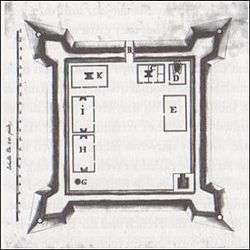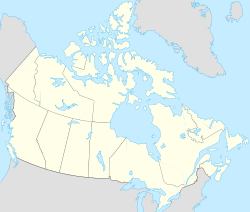Fort Menagoueche
| Fort Menagouèche | |
|---|---|
| St. John, New Brunswick, |
|
 |
|
| Coordinates | 45°15′52″N 66°04′25″W / 45.2644°N 66.0736°WCoordinates: 45°15′52″N 66°04′25″W / 45.2644°N 66.0736°W |
| Type | |
| Official name | Fort Charnisay National Historic Site of Canada |
| Designated | 1923 |
| Site information | |
| Owner |
|
| Controlled by | 1751-1755: 1758-?: ?-present: |
| Site history | |
| Built | 1751 |
| Built by |
Charles Deschamps de Boishébert et de Raffetot Ignace-Philippe Aubert de Gaspé |
| In use | 1751-1755: 1758-?: ?-present: |
Fort Menagoueche (French: Fort Menagouèche) was a French fort at the mouth of the St. John River, New Brunswick, Canada. French Officer Charles Deschamps de Boishébert et de Raffetot and Ignace-Philippe Aubert de Gaspé built the fort during Father Le Loutre's War and eventually burned it themselves as the French retreated after losing the Battle of Beausejour. It was reconstructed as Fort Frederick by the British.
Due to the succession of strategic French and British forts at this location, the site was designated a National Historic Site of Canada in 1923.
Despite the British Conquest of Acadia in 1710, Nova Scotia remained primarily occupied by Catholic Acadians and Mi'kmaq. Father Le Loutre's War began when Edward Cornwallis arrived to establish Halifax with 13 transports on June 21, 1749. By unilaterally establishing Halifax the British were violating earlier treaties with the Mi'kmaq (1726), which were signed after Father Rale's War. The British quickly began to build other settlements. To guard against Mi'kmaq, Acadian and French attacks on the new Protestant settlements, British fortifications were erected in Halifax (1749), Dartmouth (1750), Bedford (Fort Sackville) (1751), Lunenburg (1753) and Lawrencetown (1754).
Within 18 months of establishing Halifax, the British also took firm control of peninsula Nova Scotia by building fortifications in all the major Acadian communities: present-day Windsor (Fort Edward); Grand Pre (Fort Vieux Logis) and Chignecto (Fort Lawrence). (A British fort already existed at the other major Acadian centre of Annapolis Royal, Nova Scotia. Cobequid remained without a fort.)
...
Wikipedia

